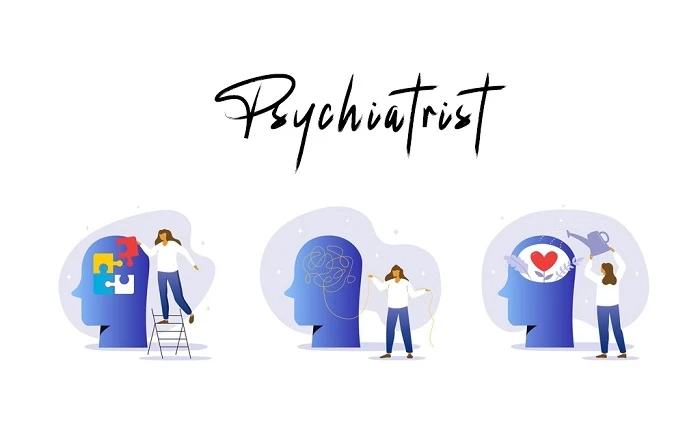Mental health psychiatrists play a pivotal role in the holistic well-being of individuals facing challenges related to mental and emotional health. This comprehensive guide explores the multifaceted responsibilities, qualifications, and approaches that mental health psychiatrists employ in their practice, emphasizing the importance of compassionate care and the evolving landscape of mental health treatment.
Introduction
Defining Mental Health Psychiatry:
Mental health psychiatry is a specialized branch of medicine dedicated to understanding, diagnosing, and treating mental health disorders. Psychiatrists are medical doctors who undergo extensive training to address the complex interplay of biological, psychological, and social factors that contribute to mental health conditions.
Scope of Practice:
Mental health psychiatrists assess and treat a broad spectrum of mental health disorders, including but not limited to depression, anxiety, bipolar disorder, schizophrenia, and various personality disorders. They employ a range of therapeutic modalities, including medication management, psychotherapy, and collaborative care.
Qualifications and Training
Medical Degree:
Mental health psychiatrists begin their journey with a medical degree, which includes foundational education in general medicine.
Residency Training:
Following medical school, psychiatrists undergo specialized residency training in psychiatry. This typically involves several years of supervised clinical practice in diverse settings.
Board Certification:
Upon completing residency, psychiatrists may pursue board certification, which involves passing a rigorous examination. Certification is often required for licensure and ensures that psychiatrists meet high standards of competence.
Continuing Education:
Mental health is a dynamic field, and psychiatrists engage in ongoing education to stay abreast of new research, treatment modalities, and ethical considerations.
Roles and Responsibilities
Diagnostic Assessment:
A fundamental role of mental health psychiatrists is conducting comprehensive diagnostic assessments. This involves evaluating a patient's mental health history, and symptoms and often collaborating with other healthcare professionals.
Treatment Planning:
Based on the assessment, psychiatrists develop personalized treatment plans. This may involve medication management, psychotherapy, lifestyle interventions, or a combination of these approaches.
Medication Management:
Prescribing and monitoring medications is a crucial aspect of psychiatric practice. Psychiatrists carefully consider the potential benefits and risks of medications and adjust treatment plans as needed.
Psychotherapy:
While psychiatrists are trained in psychotherapy, they often collaborate with psychologists, counselors, or social workers for specialized therapeutic interventions. Common modalities include cognitive-behavioral therapy (CBT), dialectical behavior therapy (DBT), and psychodynamic therapy.
Crisis Intervention:
Psychiatrists are equipped to handle mental health crises, providing immediate intervention and, when necessary, facilitating hospitalization for individuals in acute distress.
Collaborative Care:
Collaboration with other healthcare professionals, such as primary care physicians, nurses, and therapists, is a key aspect of comprehensive mental health care. This interdisciplinary approach ensures holistic support.
Advocacy and Education:
Psychiatrists play a crucial role in advocating for mental health awareness and education. They contribute to destigmatizing mental health conditions and promoting public understanding.
Approaches to Treatment
Biopsychosocial Model:
Psychiatrists employ the biopsychosocial model, recognizing that mental health is influenced by biological, psychological, and social factors. This comprehensive approach informs diagnosis and treatment planning.
Holistic Care:
Mental health psychiatrists consider the whole person, addressing not only symptoms but also factors such as lifestyle, relationships, and cultural context. This holistic approach enhances the effectiveness of interventions.
Incorporating Technology:
Advancements in telepsychiatry and digital health tools enable psychiatrists to reach a broader audience and enhance accessibility to mental health care.
Pharmacogenomics:
Emerging technologies in pharmacogenomics allow psychiatrists to tailor medication choices based on an individual's genetic profile, optimizing treatment outcomes.
Patient-Centered Care
Individualized Treatment Plans:
Patient-centered care is at the heart of psychiatric practice. Psychiatrists collaborate with patients to develop individualized treatment plans that align with their goals and values.
Informed Decision-Making:
Psychiatrists educate patients about their conditions, treatment options, and potential outcomes, empowering them to actively participate in decision-making regarding their mental health care.
Cultural Competence:
Cultural sensitivity is paramount in psychiatry. Understanding and respecting diverse cultural backgrounds ensures that treatment approaches are tailored to the unique needs of each individual.
Trauma-Informed Care:
Many individuals seeking psychiatric care have experienced trauma. Psychiatrists approach care with sensitivity to trauma history, fostering an environment of safety and trust.
Challenges and Ethical Considerations
Stigma:
Addressing mental health stigma remains a challenge. Psychiatrists actively work towards destigmatizing mental health conditions through advocacy and education.
Limited Resources:
In some settings, there may be limited resources for mental health care. Psychiatrists advocate for increased funding and accessibility to mental health services.
Ethical Considerations:
Psychiatrists navigate complex ethical dilemmas, such as confidentiality, informed consent, and the balance between autonomy and safety in cases of potential harm.
Emerging Trends and Future Directions
Precision Psychiatry:
Advancements in neuroscience and technology are paving the way for precision psychiatry, where treatments are tailored based on an individual's unique genetic, neural, and clinical profile.
Digital Therapeutics:
The integration of digital therapeutics, including smartphone apps and virtual reality interventions, offers new avenues for mental health support and treatment.
Integration of Mental and Physical Health:
Recognizing the interconnectedness of mental and physical health, there is a growing emphasis on integrated care models that address both aspects simultaneously.
Conclusion
Psychiatrists in Sugar Land Texas and Katy play a vital role in the evolving landscape of mental health care. Their expertise, empathy, and dedication contribute to the well-being of individuals facing mental health challenges. As the field continues to advance, the integration of innovative approaches, cultural competence, and patient-centered care will shape the future of psychiatric practice. Seeking the support of a mental health psychiatrist is a proactive step towards understanding, healing, and reclaiming one's mental health journey.


